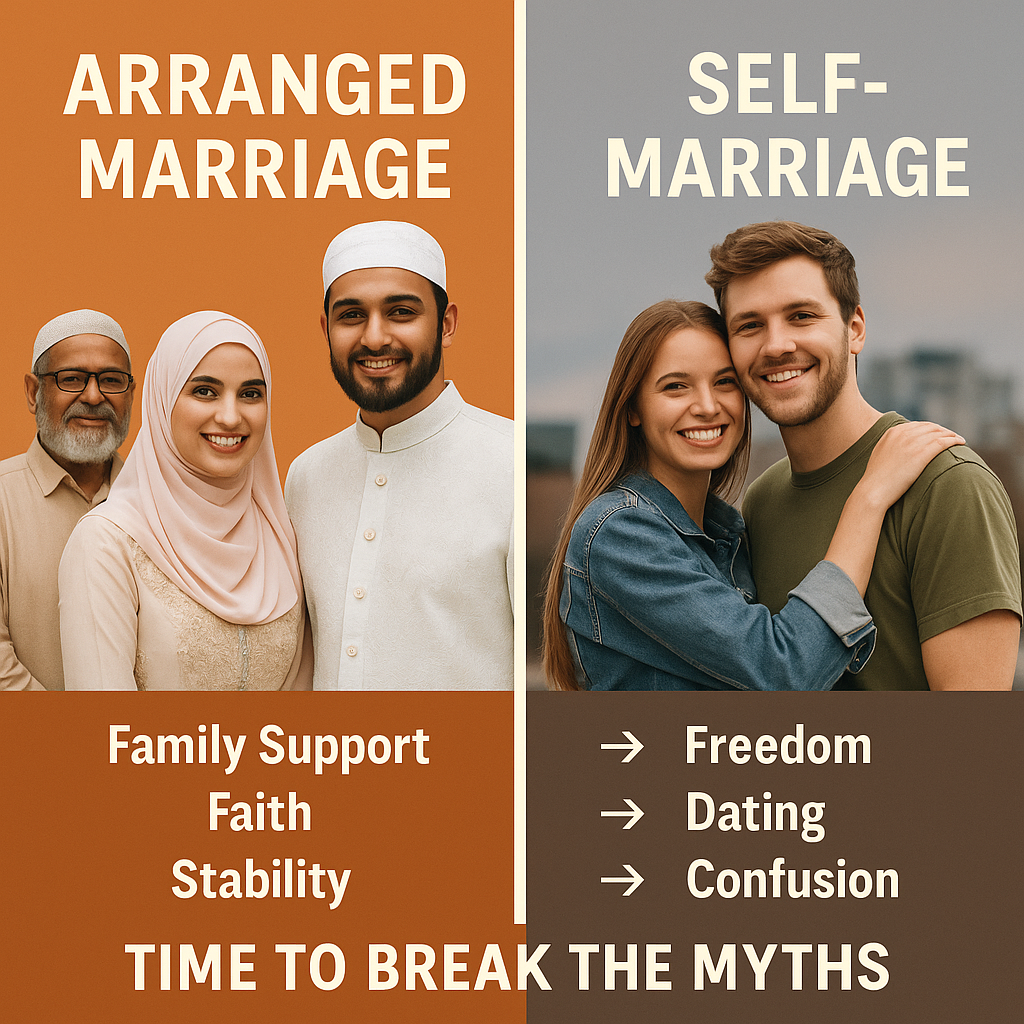
Common Myths About Arranged Marriages – Breaking Stereotypes
In a rapidly changing world influenced by media, individualism, and western ideologies, arranged marriages are often misunderstood and misrepresented. Young Muslims growing up in the West are frequently caught between traditional family values and the more individual-centric model of relationships, like dating or common-law partnerships. As a result, many are hesitant or skeptical about arranged marriages, viewing them as outdated or restrictive.
This article aims to break common myths about arranged marriages and shed light on the benefits and balance they offer when done with mutual respect and understanding.
🌟 Myth 1: Arranged Marriage = Forced Marriage
Reality:
One of the biggest misconceptions is that arranged marriages are forced. In reality, an arranged marriage simply means that the introduction is facilitated — usually by family, friends, or a trusted matchmaker — with consent from both individuals.
Islam strongly emphasizes free will in marriage. The Prophet Muhammad (PBUH) said:
“A previously married woman has more right to her person than her guardian, and a virgin must give her permission.” (Sahih Muslim)
An arranged marriage done right involves family support, individual consent, and mutual compatibility.
💑 Myth 2: Love Doesn’t Exist in Arranged Marriages
Reality:
Many believe that love only exists in self-selected relationships. However, in arranged marriages, love often grows gradually, rooted in respect, commitment, and shared goals.
In contrast, many self-marriages or dating-based relationships start with emotions but may lack deeper compatibility or family support, leading to disillusionment over time.
💡 Remember: Love is not about how you meet — it’s about how you grow together.
🧠 Myth 3: Arranged Marriage Means No Freedom of Choice
Reality:
Modern arranged marriages are flexible and considerate of personal preferences like education, deen (faith), profession, personality, and interests.
Today, many platforms — such as MuslimMatchByParents.com — allow parents and candidates to find matches with full profile transparency, privacy, and the ability to communicate before making decisions.
🔄 Myth 4: Self-Marriage Is More Compatible Than Arranged Marriage
Reality:
While self-marriages (a.k.a. love marriages or dating-based marriages) allow couples to choose each other freely, studies show that arranged marriages often have equal or higher satisfaction rates over time due to:
- Family involvement and support
- Shared values and cultural expectations
- Clear long-term intentions
Arranged marriages tend to emphasize compatibility, life goals, and faith — not just emotions.
🛑 Myth 5: Arranged Marriage Is Just About Social Pressure
Reality:
While it’s true that some families misuse the concept, a healthy arranged marriage is never about pressure. Instead, it’s a collaborative decision made in a respectful and halal way.
Islamic teachings encourage marriage as a protection for modesty, spiritual growth, and building the ummah. The goal is mutual peace and mercy — not pressure.
🔍 Common Law Partnerships vs. Islamic Marriage
Many Western societies normalize common-law partnerships — living together without formal marriage. While this may seem “freer” to some, it often lacks:
- Spiritual blessing (barakah)
- Legal and financial protection (especially for women)
- Stability for children
- Clarity in rights and obligations
In contrast, Nikah (Islamic marriage) brings structure, responsibility, and a deep sense of accountability before Allah ﷻ.
✅ Benefits of Arranged Marriage (When Done Right):
- Involves family, which offers emotional and social support
- Focused on long-term compatibility, not short-term attraction
- Encourages modesty, clarity, and commitment
- Avoids the harms of dating, heartbreaks, and delayed marriages
- Blends tradition with modern communication tools (like matchmaking websites)
🧭 What Young Muslims Should Know
It’s okay to have questions and doubts. But before dismissing arranged marriage as “old-fashioned,” consider this:
Arranged marriage is not about control.
It’s about community, guidance, and starting your journey with love and support.
With platforms like MuslimMatchByParents.com, you can experience a modern, respectful, and private way to find the right match — involving your family without sacrificing your voice.
📣 Final Thoughts:
Whether arranged or self-initiated, what truly matters is intention, compatibility, respect, and faith.
Let’s move beyond stereotypes and recognize that healthy arranged marriages are not barriers to freedom — they are bridges to a future built on love, mercy, and trust in Allah.

Rana Jee is a passionate community leader, counselor, and advocate based in Mississauga, Ontario. With a strong background in family and marriage counseling, he has dedicated his life to helping individuals and families build stronger, more compassionate relationships rooted in faith and understanding.
Rana’s work extends beyond the counseling room. He actively engages in community development through educational workshops, marriage preparation sessions, and youth mentorship programs. His efforts aim to bridge generational gaps and strengthen the social fabric of the Muslim community in North America.
In addition to counseling, Rana is deeply involved in charitable work, supporting causes that uplift underserved families, newly arrived immigrants, and individuals seeking emotional and spiritual guidance. His ability to connect with people from all walks of life makes him a trusted voice in both personal and communal matters.
Whether guiding couples through marriage challenges or empowering individuals with life tools, Rana Khan remains committed to nurturing healthier, faith-centered communities—one family at a time.

